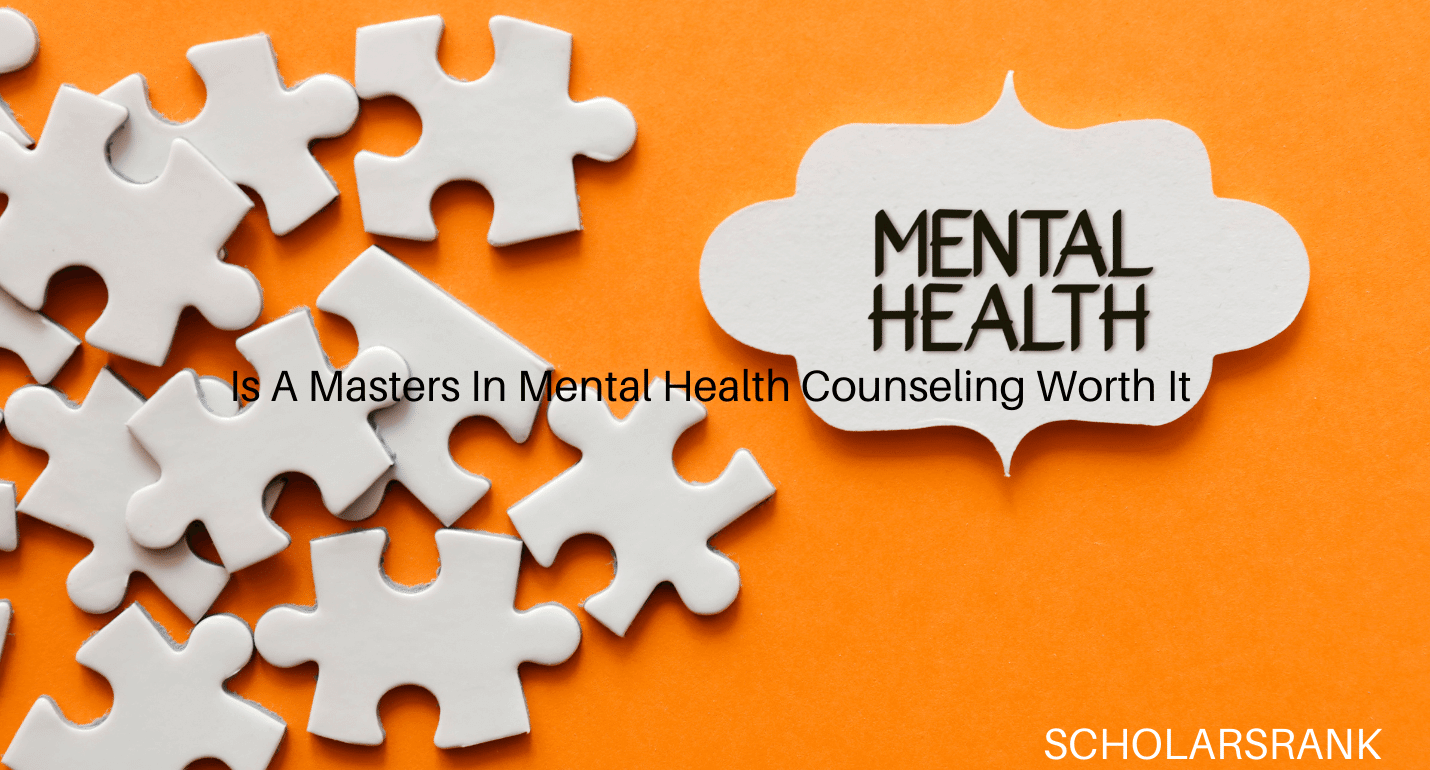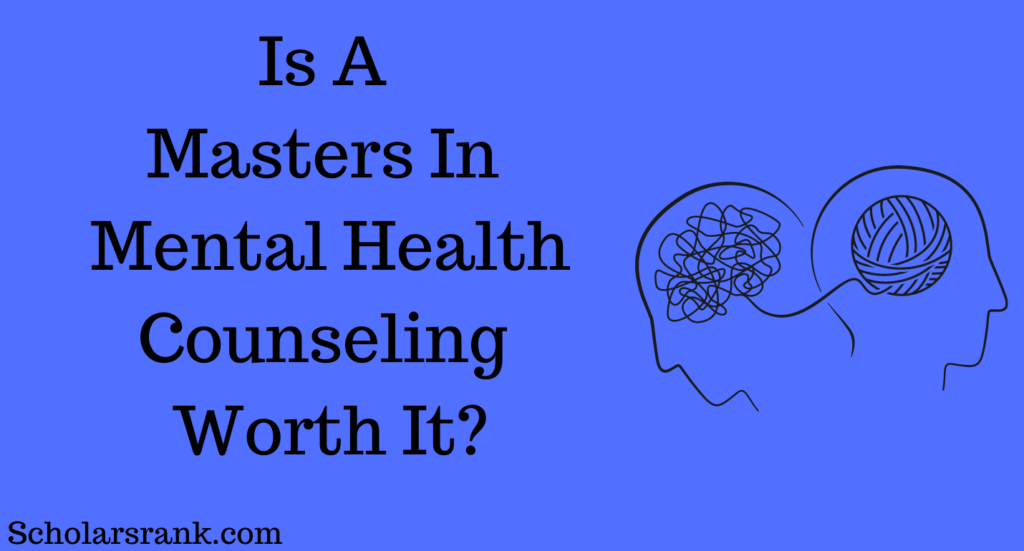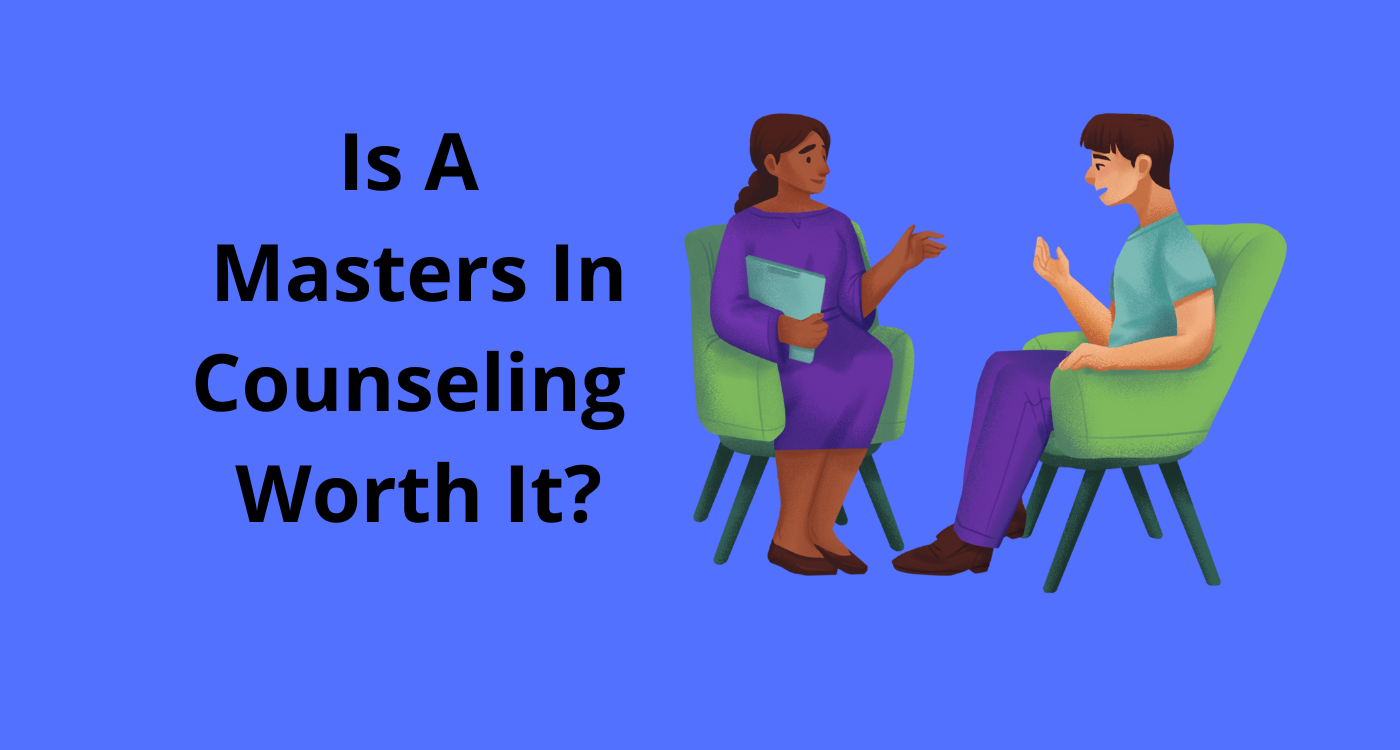Introduction
Is A Masters In Mental Health Counseling Worth It? The answer is probably yes if you are passionate about helping people and have an interest in mental health.
The American Counseling Association states that to function as a professional counselor, one must possess a graduate-level degree. Having a master’s degree proves that you are capable of working with people one-on-one and in groups to solve their behavioral, mental, and emotional issues.
A master’s degree in mental health counseling can help you land a fulfilling job where you can improve the wellness of people and families.
What Is Mental Health counseling?

In a secure setting with qualified mental health specialists by their sides, mental health therapy enables people and communities to address their emotional, behavioral, and mental health issues.
What does a mental health counselor do? The duties and responsibilities of a mental health counselor may include diagnosing mental, behavioral, and emotional illnesses, creating therapies, and offering therapy to
- Individuals
- Couples
- Families
- Groups
- Specific groups, including children and the elderly
You may have the choice to concentrate on any number of specializations if you choose to pursue a career as a mental health counselor and become an LMHC.
Masters In Mental Health Counseling
The theory and practice of professional mental health counseling, as well as ethical norms, social and cultural considerations, and the best practices of the counseling profession, are covered in a master’s in counseling, a graduate degree type. The degree can be obtained through a master of arts or master of science program, and coursework exposes students to the most recent research in psychology and counseling as they get practical experience through practicums and internships.
The Council for Accreditation of Counseling and Related Educational Programs’ requirements should be met by all degree-seeking programs (CACREP). A master’s program in mental health counseling will prepare you for licensing as a National Certified Counselor (NCC) as well as to become a Licensed Professional Counselor (LPC) with your state when supported by this program evaluation.
What Are The Benefits Of A Master’s In Mental Health Counseling?
The first step to becoming a registered mental health counselor and working in this sector professionally is obtaining a degree in mental health counseling. The majority of states need mental health counselors to have a master’s degree in mental health counseling or a closely related discipline to be licensed, while there are some chances to work in the field with only an undergraduate degree. This means that one of the first steps you will take on the road to a job in mental health counseling is obtaining a master’s degree from a recognized institution.
You will therefore receive comprehensive training for the professional practice of counseling with a graduate degree in mental health counseling. This demanding program approach helps to ensure that you finish with the skills and knowledge you need to make a significant contribution to your field. Master’s degree programs that lead to licensure typically include 60 credit hours (two to three years of study). Doctoral degree programs typically need 45 credit hours (or more) in addition to the master’s level and offer additional counseling theory and research courses that can help you pursue academic professions or even become licensed.
Steps Frequently Taken to Become a Mental Health Counselor
The steps you take to become a certified mental health counselor may be different from those taken by your peers because every journey is different. The steps shown below, however, show a typical route. Please be aware that the LMHC title varies from state to state and may be referred to by a different name elsewhere. Before beginning the process of becoming a mental health counselor, make sure to research the state’s licensure criteria for the profession. Depending on the student’s background, specific state regulations, such as licensure standards, exam eligibility, and relevant pathways, may vary and be subject to change. People who want to become mental health counselors should conduct their research and choose the license type and pathway that are best for them and their state of practice.
- Get your Bachelor’s degree
Most students who wish to become mental health counselors begin their study by earning a degree in a subject that is connected to counseling, like psychology or sociology.
Early in your career, taking courses in lifelong human development and abnormal psychology may provide you an advantage when you progress to your PhD studies. However, a bachelor’s degree in a different field, like social work, may be sufficient to meet the criteria for a graduate program..
- Get your master’s in mental health counseling.
Although the title of this degree may vary depending on the program, a master’s in counseling is typically required to work as a mental health counselor in most states.
If you obtain your degree in mental health counseling from a university that has been accredited by the Council for Accreditation of Counseling and Related Educational Programs, it is a sign that the program’s content and quality meet the high standards demanded by the mental health professional (CACREP). Despite being the most well-known accreditor, CACREP does not require accreditation from all states for graduates. Be sure to get in touch with your state board for more information.
- Clear Licensing Tests
Potential mental health counselors must pass one or more National Board for Certified Counselors (NBCC) exams, such as the National Counselor Examination (NCE) and the National Clinical Mental Health Counseling Examination, to practice in any state, the District of Columbia, Guam, or Puerto Rico (NCMHCE). State-specific exams may also be needed for applicants, though this will vary by state.
- Complete Supervision In A Clinical Setting
You must do graduate and postgraduate internships under the supervision of certified counselors to gain practical experience prior to becoming licensed to provide mental health counseling. States may require between 2,000 and 3,000 clinical hours for some levels of licensing. Students must obtain an initial license, which can be thought of as a temporary professional license and entitles the graduate to post-degree practice under the supervision of a licensed independent practitioner. Depending on the state, this license may be referred to as an Associate Licensed Counselor or a Registered Mental Health Counselor Intern.
- Request A License
Passing your licensing exam is an important step in your journey. Applying for state-issued mental health licensure is the next step. This will be viewed as authorization to engage in independent practice. It is crucial to adhere to the counseling board regulations in the state where you want to operate because different jurisdictions have different licensure requirements.
- Obtain Further Certifications In Mental Health Counseling
Using the NBCC to apply to become a National Certified Counselor is one choice open to candidates (NCC). This is typically voluntary, though it might be required in some places before licensure. However, it’s possible that certification standards and licensing standards aren’t the same, so applicants should check with the NBCC for more information.
You can apply for certificates in mental health counseling once you have your license. The Certified Clinical Mental Health Counselor (CCMHC) designation from the NBCC is open to counselors who have a graduate degree with at least 60 credits, who are already NCCs, and who have at least 3,000 hours of postgraduate clinical experience.
- Keep Your License As A Mental Health Counselor Updated
You might wish to keep abreast of developments in the mental health industry as a licensed mental health counselor. You might be able to give your customer the best care if you keep learning. Your state might mandate that you accrue continuing education credits regularly because of this.
Career Options For A Masters In Mental Health Counseling
There are many different types of mental health problems and treatments, as well as different pricing points and levels of expertise. There are many different situations and contexts where people seek therapy.
Here are some of the several counseling and mental health occupations that are accessible, each with a particular focus on therapy and amount of training.
- Rehabilitation Counselors
Clients with mental and emotional problems might receive assistance from mental health counselors who also serve as rehabilitation counselors. They support these people’s independent living.
Rehabilitation counselors create treatment plans that help clients advance toward independent living after assessing their client’s interests, abilities, and requirements. To find resources and services that promote their clients’ independence, they may collaborate with a group of medical professionals and therapists.
- Substance Abuse Counselor
Working with clients to address and treat their addiction is one of the duties of a drug abuse counselor, often known as an addiction counselor. You can combine a 12-step program with other forms of therapy.
To better continue their rehabilitation, you would assist your customers in coping with life’s everyday stresses. You could also help them with other areas of their lives where their addiction may have had an effect, such as their professions or personal relationships.
- Therapist For Marriage And Families
To assist individuals, couples, and families, marriage, and family therapists concentrate on family dynamics in their treatment. These counselors use a range of psychological techniques as they assist clients in exploring their feelings and experiences.
Marriage and family therapists help their patients alter behaviors and make decisions for the future by working mostly in private practice. They may also direct clients to centers for addiction treatment or other specialized options for substance misuse.
- Behavioral Disorder Counselor
Working with people who are dealing with a variety of difficulties, such as attention deficit hyperactivity disorder (ADHD), obsessive-compulsive disorder (OCD), or post-traumatic stress disorder, is typical for behavioral disorder counselors (PTSD).
A variety of addictions, aggressive conduct, emotional problems like melancholy and anxiety, and unfriendly people may all benefit from your assistance.
You can do a patient evaluation, create a treatment strategy, and support the patient’s recovery. Patients may also benefit from your assistance with their interpersonal and professional relationships and other elements of their lives.
- Substance Abuse And Mental Health Medical Social Worker
Clients with mental health issues or addiction disorders receive assistance from licensed clinical social workers. They work to improve their clients’ mental well-being even if they could run into a variety of mental and emotional issues.
Clinical social workers create treatment plans for their clients to assist them to overcome mental obstacles after evaluating their requirements and available resources. These social professionals might offer psychotherapy or direct patients to the correct resources for their care.
Is A Masters In Mental Health Counseling Worth It?
For many professions, getting a master’s degree in mental health counseling is worth it. Community and social service jobs are expected to rise at 12% over the next ten years, substantially faster than the average for all occupations, according to the Bureau of Labor Statistics.
Careers in mental health counseling that are frequently found in this area include marriage and family therapists, school and career counselors, substance abuse or addiction counselors, behavioral disorder counselors, and mental health counselors.
Although qualifications may differ, most counseling roles call for a master’s degree in the subject in addition to licensure. Counselors should possess a high level of empathy and compassion, as well as excellent communication skills, in addition to academic qualifications.
You might learn the knowledge and skills required to be a successful counselor via a master’s degree program in mental health counseling. You’ll learn about mental health issues as well as the responsibilities that come with counseling on an ethical and legal level. You could be able to choose your field of counseling specialization thanks to the learning procedure.
There are so many different ways you can help people in this field, from helping a couple going through divorce to talking with one another to assisting an alcoholic to maintain sobriety.
Alternatives To A Masters In Mental Health Counseling
You might also want to take a look at some of these similarly related choices if you’re thinking about getting a degree in mental health counseling.
| Masters In Social Work | Masters In Clinical Psychology | Masters In School Counseling | Masters In Marriage And Family Therapy |
| A graduate degree in social work can help you gain the credentials, education, and expertise required to make a difference in this demanding field if you want to work in the community as a social worker. If you have a strong affinity for helping people, social work can be your field of choice. You will work with the most vulnerable individuals and families in this profession, assisting them in achieving their mental health objectives. | A master’s in clinical psychology can serve as a stepping stone to a Ph.D. in psychology and will assist in preparing you to work under the supervision of a licensed psychologist. Even if you find human behavior fascinating, you might not want to work as a counselor. You can work in different industries with a master’s in psychology, such as human resources or research. | School counselors frequently possess a degree, license, or certificate in school counseling, giving them the credentials to guide young people down a successful route. | You are qualified to assist families and couples in overcoming challenges if you have a master’s degree in family and marriage therapy. Counselors assist clients in talking about their feelings and experiences and in coming to wise judgments about their futures. |
Conclusion
Is A Masters In Mental Health Counseling Worth It?
You might opt to pursue your master’s in mental health counseling after thorough thought and research. When that happens, you should look into your program possibilities. Verify that the institution and the degree program are both accredited before deciding on a school.
Many counseling-related careers, such as those as a drug abuse counselor, behavioral disorder counselor, mental health counselor, or marital or family therapist, may be accessed with a master’s in mental health counseling. As with any career, your starting point is probably not where you’ll end up. Leadership opportunities in social, community service, or community health groups could also be opened up by this degree.
Because you have the opportunity to change so many lives with your superior knowledge, effective communication skills, and compassion, many people find their employment to be personally satisfying.
You will have the flexibility to balance other elements of your life, such as your existing employment and family duties if you decide to pursue a degree online. Start your fascinating educational adventure by researching the several online master’s degree programs in mental health counseling!
Frequently Asked Questions (FAQs)
Is a Master’s Degree Required to Work as a Mental Health Counselor?
- What degree is required to work as a mental health counselor is a common question. A master’s degree is necessary to become a certified mental health counselor. Some states may demand a master’s degree in mental health counseling. Most states require graduate students to complete 60 semester hours of coursework, including a minimum of 48 semester hours for a master’s degree from an authorized program. The industry’s most favored accreditor is CACREP. To find out if this is necessary, be sure to check with your state board.
Where Do Mental Health Counselors Work?
- Hospitals, clinics, drug rehab institutions, and residential mental health facilities are among the places where mental health counselors may work. A licensed professional counselor may also be employed by the government, in private practice, in educational institutions, and employee help programs run by businesses. Most mental health professionals are employed full-time. Some people who work in inpatient facilities could have a variety of shifts, including evening, night, and weekend shifts.
You can also read, “Is A Masters In Human Services Worth It In 2023?“








